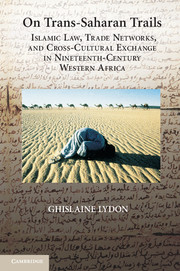Crossref Citations
This Book has been
cited by the following publications. This list is generated based on data provided by Crossref.
Bah, Mohamed Fall Ould
2009.
Entrepreneurs moraux et réseaux financiers islamiques en Mauritanie.
Afrique contemporaine,
Vol. n° 231,
Issue. 3,
p.
99.
Ficquet, Éloi
2009.
Cultures de l'écrit en Afrique. Anciens débats, nouveaux objets.
Annales. Histoire, Sciences Sociales,
Vol. 64,
Issue. 4,
p.
749.
Henige, David
2009.
Impossible to Disprove Yet Impossible to Believe: the Unforgiving Epistemology of Deep-Time Oral Tradition.
History in Africa,
Vol. 36,
Issue. ,
p.
127.
Ficquet, Eloi
2010.
L’Afrique comme pictogramme.
Cahiers d'études africaines,
Vol. 50,
Issue. 198-199-200,
p.
405.
2011.
A History of Race in Muslim West Africa, 1600–1960.
p.
173.
Diallo, El Hadji Samba Amadou
2011.
Exploring a Sufi Tradition of Islamic Teaching: Educational and Cultural Values Among the Sy Tijāniyya of Tivaouane (Senegal).
Social Compass,
Vol. 58,
Issue. 1,
p.
27.
2011.
A History of Race in Muslim West Africa, 1600–1960.
p.
69.
Blanchard, Emmanuel
and
Thénault, Sylvie
2011.
Quel « monde du contact » ? Pour une histoire sociale de l'Algérie pendant la période coloniale.
Le Mouvement Social,
Vol. n° 236,
Issue. 3,
p.
3.
2011.
A History of Race in Muslim West Africa, 1600–1960.
p.
241.
HALL, BRUCE S.
2011.
HOW SLAVES USED ISLAM: THE LETTERS OF ENSLAVED MUSLIM COMMERCIAL AGENTS IN THE NINETEENTH-CENTURY NIGER BEND AND CENTRAL SAHARA.
The Journal of African History,
Vol. 52,
Issue. 3,
p.
279.
Mikhail, Alan
2011.
Global Implications of the Middle Eastern Environment.
History Compass,
Vol. 9,
Issue. 12,
p.
952.
2011.
A History of Race in Muslim West Africa, 1600–1960.
p.
27.
Scheele, Judith
2011.
Circulations marchandes au Sahara : entre licite et illicite.
Hérodote,
Vol. n° 142,
Issue. 3,
p.
143.
Boum, Aomar
2011.
Saharan Jewry: history, memory and imagined identity.
The Journal of North African Studies,
Vol. 16,
Issue. 3,
p.
325.
Scheele, Judith
2012.
Articulating Islam: Anthropological Approaches to Muslim Worlds.
p.
33.
Hall, Bruce S.
and
Addoun, Yacine Daddi
2012.
African Voices on Slavery and the Slave Trade.
p.
485.
Scheele, Judith
2012.
L’énigme de lafaggāra: commerce, crédit et agriculture dans le Touat algérien.
Annales. Histoire, Sciences Sociales,
Vol. 67,
Issue. 2,
p.
471.
Marsden, Magnus
and
Retsikas, Konstantinos
2012.
Articulating Islam: Anthropological Approaches to Muslim Worlds.
p.
1.
Wilson, Andrew
2012.
Saharan trade in the Roman period: short-, medium- and long-distance trade networks.
Azania: Archaeological Research in Africa,
Vol. 47,
Issue. 4,
p.
409.
Goodman, R. David
2012.
Demystifying “Islamic Slavery”: Using Legal Practices to Reconstruct the End of Slavery in Fes, Morocco.
History in Africa,
Vol. 39,
Issue. ,
p.
143.



